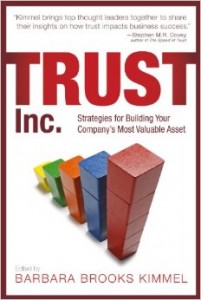Trust Quotes: Interview with Barbara Kimmel, of Trust Across America
 I got to know Barbara and Jordan Kimmel some years ago when they were forming the initial idea for what became Trust Across America, an organization devoted to improving corporate trustworthiness.
I got to know Barbara and Jordan Kimmel some years ago when they were forming the initial idea for what became Trust Across America, an organization devoted to improving corporate trustworthiness.
Barbara edited a book which is about to be published (November 1), called Trust Inc.: Strategies for Building Your Company’s Most Valuable Asset. This seems like a good time to interview her on Trust Matters. Enjoy.
Q. Barbara, congratulations on the new book, which is most impressive: I got my advance copy a few days ago. Before we get into that, however, tell us about Trust Across America – Trust Around the World. What is it, how did you come to found it, and what is its purpose?
A. Very simply, TAA – TAW is an umbrella organization and clearinghouse whose mission is enhancing trustworthy behavior in organizations. We got the program rolling in 2009 in the wake of the financial crisis, realizing that no group was addressing organizational trust from a holistic and collaborative perspective.
Today we sponsor four main initiatives:
- The FACTS® Framework measures the trustworthiness of 2500 public companies using 5 quantitative indicators of organizational trust;
- Communications efforts, featuring programs like our Trust Talks YouTube Channel, Trust Across America Radio, Blog roll, Trust Breakfast Roundtables, Trust Workshops and a Reading Room, to name just a few.
- The Alliance of Trustworthy Business Experts (ATBE) formed in January 2013, is a growing group of global experts working collaboratively, through a number of initiatives, to tackle trust head on.
- Most Trustworthy Programs. Every year we name our Top Thought Leaders in Trustworthy Business and our Most Trustworthy Public Companies.
Q. The new book is a collection of 30-plus author-experts on trust. It’s got an introduction by Ken Blanchard and book cover quote from Steven M.R. Covey –
A. – not to mention the opening article by you and me writing together!
Q. – thank you, thank you. Now, where did the idea for the book come from?
A. Well, here are some headlines from 2012 to the present. They serve as a good starting point to answer your question.
The Washington Post reported that “the federal government imposed an estimated $216 billion in regulatory costs on the economy (in 2012), nearly double its previous record.”
The cost of the tort litigation system alone in the United States is over $250 billion. – or 2% of GDP (Forbes, January 2012)
“Americans are fed up with politics, not government, study says” (trust in government at 50 year low for five years running)- September 2012, Government Executive
The Big 4 accounting firms’ aggregate global revenue is $110 billion, of which between 40-50% is made up of audits. (Going Concern, January 2013)
The six biggest U.S. banks, led by JPMorgan Chase & Co. (JPM) and Bank of America Corp., have piled up $103 billion in legal costs since the financial crisis, more than all dividends paid to shareholders in the past five years. (Bloomberg, August 2013)
I’ve had the honor of meeting dozens of global experts, each with his or her unique perspective on organizational trust. It occurred to me that if I could bring them together to write a series of essays, perhaps we could collectively begin to provide a new roadmap for organizational trust.
Q. OK. Now, with that as background – tell us a bit about the book itself?
A. There’s a well-documented business case for trust ranging from deepening employee commitment to higher profitability. This book contains a lesson for everyone, from CEOs to Boards, senior management, and small business owners. Trust is a core quality of all great leaders and organizations.
We have 34 experts in all joining forces to tackle organizational trust. In addition to Covey and Blanchard, we’ve got Kouzes & Posner, Patricia Aburdene, and Linda Locke, to name just a few.
Through dozens of case studies, real world situations, models and examples, the book talks about:
- Why trust matters
- How trust works in practice
- What it takes to be a trustworthy leader
- How trustworthy teams impact business
- How to restore trust
- What the future holds in store
The book also has 3 appendices:
- Definitions of organizational trust from a global perspective
- Examples of vision and values statements
- A call to action
Q. We see boatloads of survey data about how trust is down these days, in almost every institution. What should we make of all that?
A. Charlie, you and I have spoken about painting trust with broad brush strokes. Industry is not destiny. There are many organizations that are exhibiting high levels of trust. It all boils down to culture and leadership. We see companies that rise to the top of our FACTS Framework, year after year. Those companies outperform their peers and benchmarks like the S&P – in terms of stock market performance. This proves that trustworthy companies are not sacrificing profitability.
Q. I have seen some of that data and it is really impressive. In fact, the whole broad basis of the initiative is impressive. Anything you want to add from the bully pulpit here?
A. Thank you for the opportunity to talk about our new book and our goals for TAA –TAW. We are chipping away at the organizational trust issue and plan to continue to create new tools and programs. I urge your readers to drop me a note if they have something to add to the conversation or would like to roll up their sleeves and get involved. [email protected]
Barbara Kimmel, Executive Director, Trust Across America – Trust Around the World

 I had lunch the other day with Jack S., a client from 5 years ago. At the time, Jack managed a sales organization in the reinsurance business. (If you think insurance is complicated, try understanding reinsurance!).
I had lunch the other day with Jack S., a client from 5 years ago. At the time, Jack managed a sales organization in the reinsurance business. (If you think insurance is complicated, try understanding reinsurance!). (This post is written jointly with
(This post is written jointly with  The UK press is screaming ‘blue murder’ about the recent turn of events in the BBC:
The UK press is screaming ‘blue murder’ about the recent turn of events in the BBC: The term “financial advisor” covers a wide range of activity, from insurance sales to asset manager to broker to financial planner, and many more. Both providers and consumers of financial advisory services are well advised to get some perspective about this business.
The term “financial advisor” covers a wide range of activity, from insurance sales to asset manager to broker to financial planner, and many more. Both providers and consumers of financial advisory services are well advised to get some perspective about this business. Charlie: What’s driving this move? What’s been the customer experience of the financial advisory business over the past 30 years? The past 10?
Charlie: What’s driving this move? What’s been the customer experience of the financial advisory business over the past 30 years? The past 10?